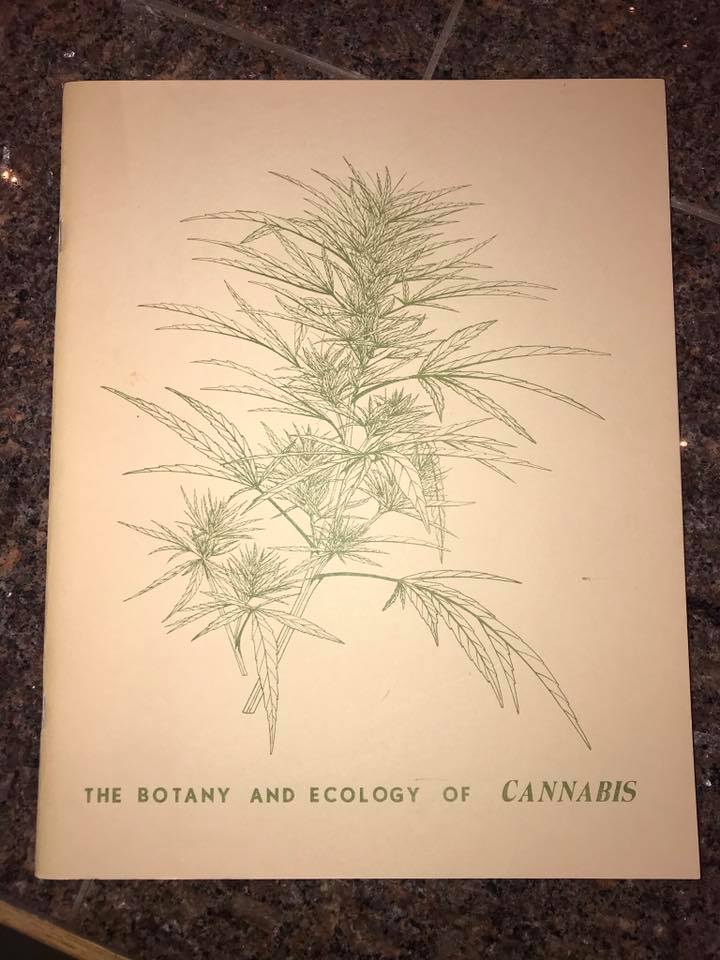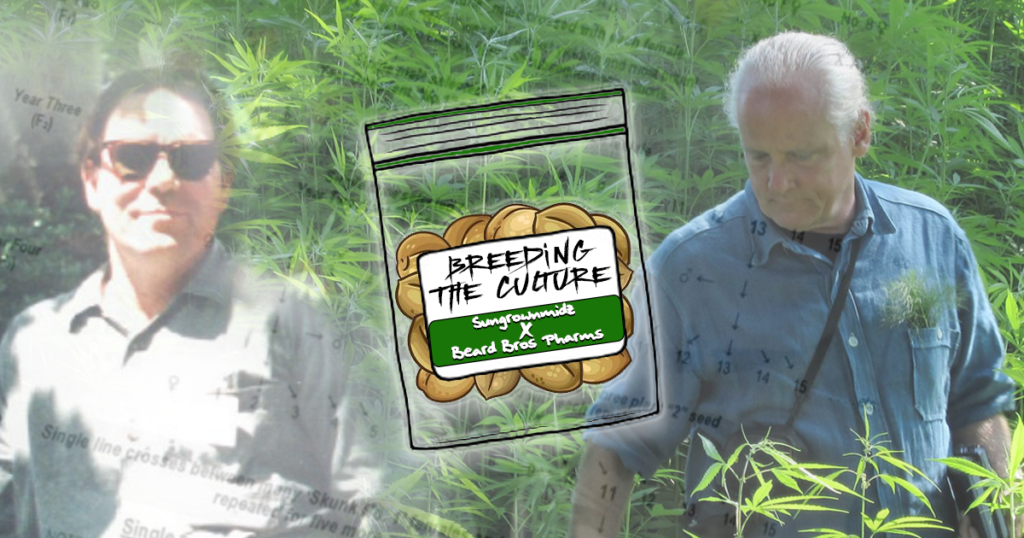The introduction of Skunk No.1 into the global marketplace is just the beginning of this fascinating installment of Breeding the Culture
David Watson and Robert Clarke have had the most significant impact in the field of cannabis research and modern-day cannabis breeding. From their academic and scholarly work to their cannabis germplasm collection and breeding, David Watson and Robert Clarke have had an immense impact on cannabis history, culture, and breeding.
Beginning in the 1970s David Watson and Robert Clarke began publishing articles and books on the subject of cannabis cultivation and breeding specifically.
Robert Clarke published his first book Botany and Ecology of Cannabis in 1977. In 1979 Blotter magazine published the article Sun, Soil, Seeds and Soul, written by David Watson under the pen name “Selgnij”. In this article, Watson  provides detailed descriptions of how to grow and more specifically how to breed cannabis. He describes the traits of various cannabis varieties associated with specific geographic locations as well as describing different characteristics of various types of hashish from around the world.
provides detailed descriptions of how to grow and more specifically how to breed cannabis. He describes the traits of various cannabis varieties associated with specific geographic locations as well as describing different characteristics of various types of hashish from around the world.
In 1981 Robert Clarke’s book Marijuana Botany was published, which, much like Watson’s article in Blotter, is to this day the best introductory text on the subject of cannabis breeding.
Watson, Clarke, and McPartland co-authored Hemp Diseases and Pests which is still to this day the most comprehensive text available addressing the subject of pest identification and management in the context of cannabis cultivation. Robert Clarke’s book Hashish is a seminal text on the history and practices of hashish producing cultures around the world. Cannabis: Evolution and Ethnobotany co-authored by Robert Clarke and Mark Merlin is the most comprehensive text on the subject of the evolution, dissemination, and history of cannabis and its uses around the globe. From his days at the University of California Santa Cruz in the 1970s through his life’s work researching and writing about cannabis in all of its many facets Robert Clarke has become one of if not the preeminent scholar on the subject of cannabis evolution, history, and culture.
Over the years both Clarke and Watson have conducted extensive collection of cannabis germplasm from imported accessions as well as through their own travels to traditional producing regions around the world. Watson is said to have run an import-export business from Thailand, as well as having backpacked and traveled to traditional producing regions around the globe. Clarke, as well, has conducted his own work researching and collecting cannabis history and genetics over multiple decades.
In the 1970/early 80s Watson and Clarke conducted clandestine breeding projects in the United States helping to produce and/or preserve a number of hybrid varieties such as Skunk No.1, Early Pearl, and Haze. During this time Watson and Clarke met Mel Frank and Ed Rosenthal. Mel gave Watson the Durban (b) and Afghani No.1 lines that were eventually taken to Amsterdam.
In 1985 David moved to Amsterdam bringing with him his extensive seed collection introducing Skunk No.1, the Haze, Hindu Kush, Afghani No.1, and Durban to Holland, marking one of the important events in the creation and global dissemination of modern hybrid drug cannabis. These early inbred and hybridized lines created and/or collected by Clarke and Watson became the foundation of many modern drug hybrids that proliferated globally in the decades that followed.

Skunk No.1 helped to revolutionize cannabis cultivation. Skunk No.1 was one of the first varieties intentionally and successfully bred and cultivated for commercial production. In 1988 Watson’s seed company Cultivators Choice entered and won the first-ever Cannabis Cup with Skunk No.1.
Skunk No.1 quickly became a staple of Amsterdam seed banks offerings from Positronics/Lowland Seed Co., Nevils Seed Bank, and the Super Sativa Seed Club becoming a backbone of most modern cannabis hybrids. The Skunk No.1 breeding program conducted by Watson and documented by Clarke and Merlin in Cannabis Domestication, Breeding History, Present-day Genetic Diversity, and Future Prospects is a textbook example of recurrent mass selection using a pedigree breeding method to accomplish a specific end goal.
The Skunk No.1 breeding project is one of, though certainly not, the only extensive breeding projects undertaken by Watson. This project highlights a number of important points both about Watson’s breeding methods (eg. the use of large populations for selection, recurrent mass selection, the pedigree method to develop highly uniform inbred lines, the use of laboratory analysis of cannabinoid and terpene content to inform the selection process, etc.) as well as the nature of his collaborative work with Robert Clarke who has played more of an academic and educational role cataloging and documenting as well as informing the work of people like David Watson and others in the field of cannabis breeding.
In the 1990s David Watson founded Hortapharm BV where he and Robert Clarke worked together with other field specialists to breed and produce single cannabinoid (>95%) cannabis varieties for pharmaceutical application. Hortapharm successfully bred single cannabinoid cultivars (as well as mixed chemotype cultivars). By the late 1990s, Hortapharm BV entered into a licensing agreement providing these cultivars to GW Pharmaceuticals which has successfully developed two FDA-approved drugs: Sativex and Epidiolex.
Hortapharm’s work has demonstrated how a scientific cannabis breeding strategy with a specific end goal can accomplish commercial results in the field of biopharmaceuticals. Through their work with Hortapharm, Watson and Clarke proved that whole cannabis plant extracts could be made to efficiently and safely produce pharmaceutical-grade cannabinoid-based therapeutics that were superior to synthetic pharmaceuticals like Marinol.
Over the years Watson’s contribution to cannabis breeding has not been limited to the production of drug varieties for recreational and pharmaceutical applications; he has also played an instrumental role in breeding industrial hemp. For example, Watson is responsible for sourcing and providing the parental germplasm VR313 and VR 315 collected from the Vavilov Research Institute that was used to create the hemp variety Finola.
Watson and Clarke also founded the International Hemp Association, which published the peer-reviewed International Hemp Association Journal, the first ever scholarly journal dedicated specifically to academic research in the field of hemp agronomy. The IHA helped to forge an international network of scholars, plant breeders, farmers and proponents of hemp cultivation to create real data driven science to inform agricultural practices, academic research and policy making discussions around the world.
Watson and Clarke’s contribution to modern cannabis breeding from their published articles and books, to their collection and dissemination of cannabis germplasm, their contribution to early hybrid cannabis breeding in the US that helped to form the foundation of many modern drug cannabis hybrids, to their work breeding for whole plant pharmaceutical mono cannabinoid varieties, to breeding industrial hemp varieties, have certainly left an indelible mark on cannabis history, culture and genetics.
Source material:
http://pericles.ipaustralia.gov.au/pbr_db/docs/2001003.doc
http://www.internationalhempassociation.org/jiha/iha03114.html
https://www.thecannachronicles.com/sun-soil-seeds-soul-1979/
https://www.fastcompany.com/48172/dr-dopes-connection
https://beyondthc.com/skunk-comes-out-of-the-closet/
https://beyondthc.com/wp-content/uploads/2016/09/BAyer-GW-2003.pdf
http://www.internationalhempassociation.org/jiha/jiha5113.html
http://www.internationalhempassociation.org/jiha/iha01202.html
https://www.nytimes.com/2020/05/23/sunday-review/coronavirus-cbd-oil.html
https://www.cannabisbusinesstimes.com/article/breeding-excellence/

















